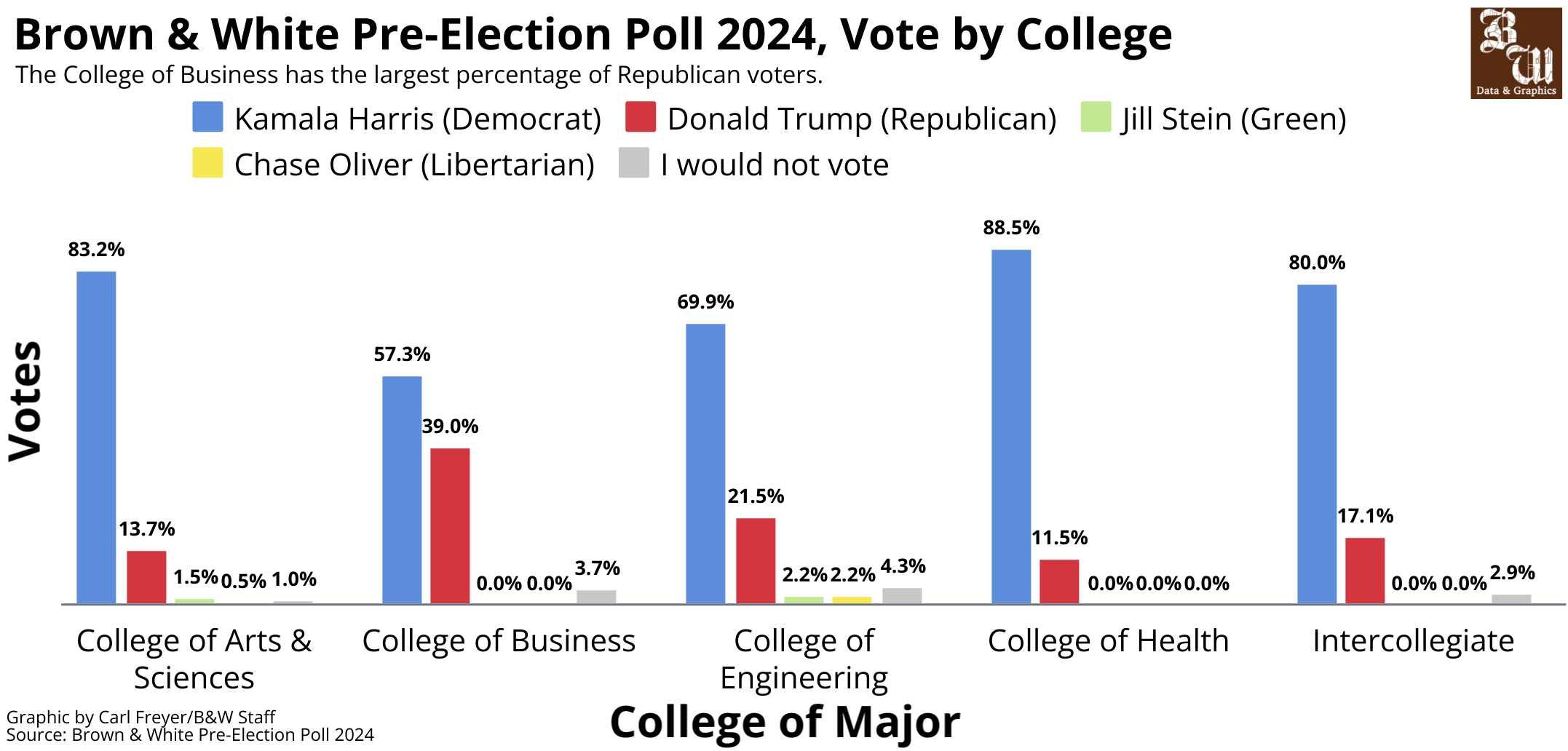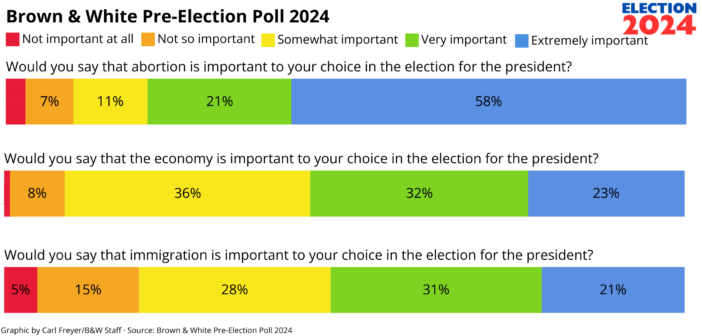In the lead-up to the 2024 presidential election, 555 students, staff, faculty and alumni participated in The Brown & White’s 2024 pre-election poll. The poll was posted on social media, shared by numerous departments, appeared as an ad in the physical paper and was placed on fliers throughout campus.
 A total of 74.6% of respondents wrote they had voted for or were planning to vote for Vice President Kamala Harris, compared to 20.9% who support former President Donald Trump.
A total of 74.6% of respondents wrote they had voted for or were planning to vote for Vice President Kamala Harris, compared to 20.9% who support former President Donald Trump.
In addition to the presidential race, respondents were polled on specific policy issues and were prompted to rate their importance on a five-tier scale ranging from “Not important at all” to “Extremely important.”
Nearly 60% of respondents labeled abortion as “extremely important,” more than double the rating of any other issue.
Carly Dickerson, the associate director of the Center for Gender Equity, said college students are in the time of their life where they’re making decisions about their reproductive rights, and the election outcome adds a challenge to that decision.
She said the issue impacts everyone, whether they grew up in a liberal or conservative household.
“When they’re confronted with the reality of what it means to restrict or get rid of abortion access, they are able to have that flexibility in their thinking,” Dickerson said.
Entering this year’s election, 21 states have enacted restrictions on abortion access following the overturning of Roe v. Wade in 2022.
Lehigh students are overwhelmingly from states where abortion rights are currently protected. Only 7.3% of Lehigh’s domestic student population comes from one of the 21 states with restrictions — most of whom are from Texas and Florida.
Many respondents cited a motivation to vote in their home state because they want to keep their state’s existing protections.
“I have decided to vote in my home state as to protect abortion rights and help to swing Michigan blue once more,” a class of 2028 respondent wrote in the poll’s comment section. “My own rights and those of my peers are on the line as a college student here in Pennsylvania.”
After abortion, the two issues rated the second and third highest among students were climate change and the economy.
Trump’s support among respondents for his economic policies outpaced his at-large support, with 27% of respondents believing he would be the best choice for the economy. In total, 46% of respondents felt either Trump would be better on economic issues or neither candidate would do better than the other.
“As a Californian, I know Californian Democratic policies hurt the upper middle class while increasing the cost of living for everyone,” a class of 2027 respondent wrote. “My expectation for (Harris) is that she will be Biden but worse.”
Inflation in the U.S. reached a 40-year high in 2022 when prices increased by 6.2%, according to the Bureau of Labor Statistics. While inflation has since slowed, the current projected 3.6% rate still places inflation during all four of Biden’s years higher than any year since 1992.
For respondents who indicated they were leaning toward voting for Trump, economic issues were a key selling point for the Republican candidate.
“(Harris) isn’t taking issues with immigration or the economy seriously,” a class of 2026 respondent wrote. “I think her objectives lie in many social and climate issues but honestly I don’t think that is energy well spent.”
Harris performed the best among respondents in regard to protecting America’s democratic issues. Nearly 80% of respondents indicated they believe Harris is the better candidate for “…preserving democracy as president,” a five-percent boost over her at-large support.
Respondents backing Harris expressed concern over the response Trump will have following the election, regardless of who’s announced as the winner.
“I believe that it will get very messy if Trump loses, and my personal prediction is that he will lose, which makes me nervous,” a class of 2028 respondent wrote. “However, I think that if he does win, the democracy of the U.S. is in danger as well.”
Supporters of both candidates indicated agreement on one thing: strong disapproval of the other candidate.
When asked whether each candidate cares about your needs, on a scale of 1-5 — 1 being “strongly disagree” and 5 being “strongly agree” — a majority of Harris supporters put Trump firmly in the strongly disagree category. Most Trump supporters put Harris in the same place.
Less than half of respondents selected strong agreement with either candidate, which indicates potential displeasure with both sides.
“Both candidates are bad, but honestly choosing the lesser of two evils is better than not choosing at all,” a class of 2027 respondent wrote. “If you want your choice and opinion to matter, go vote.”






Comment policy
Comments posted to The Brown and White website are reviewed by a moderator before being approved. Incendiary speech or harassing language, including comments targeted at individuals, may be deemed unacceptable and not published. Spam and other soliciting will also be declined.
The Brown and White also reserves the right to not publish entirely anonymous comments.
2 Comments
Well, given the level of indoctrination found within K-12 (continuing into so-called “higher education”) – the results were not particularly surprising. With all of the turmoil throughout the world and economic uncertainty (which will defiantly impact the next several graduating classes), I am disappointed that abortion was such a major topic (given that it is readily available and has not been outlawed). One thing missing from the reporting was the demographic breakdown of those who responded. It would have provided a bit more color v-a-v the results. In any event, one can not “place an old head on young shoulders”. Methinks that near-term events are going to force the student body to reassess their priorities. Be well.
I think that 39% of respondents from the College of Business need to revisit their Ethics lessons.